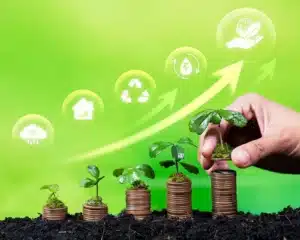CSR and SDGs: How Companies Are Making a Difference

The last few years have seen companies’ growing demand for social responsibility. This is because socially responsible companies must be accountable to themselves, stakeholders, and the general public.
Companies that begin social responsibility programs, in turn, can help society develop sustainably through the distribution of interests among economics, regulation of ecological needs, and meeting social expectations.
Sustainability is an immense challenge to address, CSR. It has the potential to strengthen consumer engagement, green purchasing behavior, beneficial understanding, and trust toward corporations.
CSR also plays a significant role in the implementation of the UN SDGs that aim to curb social injustices and poverty, mitigate climate change, and protect ecosystems.
Businesses can participate in the 17 SDGs to achieve the UN global sustainability goal as well as create positive change and stabilize communities through the same means.
CSR operations of businesses can be very helpful since they create opportunities for firms to implement social activities and eclectic behaviors.
Examples of CSR include:
- Skilled international service through pro bono volunteerism
- Community development
- The dispensation of grants in favor of charitable institutions and causes constitutes one of the purposes served by the monetary system.
- Running a business ethically about decision making in doing investment
Overview of SDGs
The Sustainable Development Goals (SDGs) or the Global Goals, a nineteen-goal framework, was adopted by the United Nations in 2015 to tackle global challenges.
The goals are interconnected and aim to balance the three dimensions of sustainable development: economic, social, and environmental.

Sustainable Development Goals (SDGs) are a rallying call for the world to eradicate poverty and inequality as well as to save the planet through reduction of carbon emissions as well as preserve the environment which provides many benefits to the health, justice, and prosperity of all citizens by 2030.
SDGs surmount challenges that include poverty, inequality, climate change, environmental degradation, peace, and justice as well.
The SDGs are important because they do their best to set up a world of peace and prosperity while removing important problems such as poverty and hunger on the same grounds, meanwhile conserving our natural environment.
Thus, for instance, Goal 5 of the SDGs is about ensuring gender equality and women empowerment across the globe for these purposes.
Gender equality no longer comes only as a social problem to be merely solved, but it is also an essential ingredient in the quest for sustainable development.
Impact of CSR on SDGs:
Integrating CSR activities in businesses is a way they can contribute in the same manner towards the accomplishment of SDGs by creating a responsible environment, encouraging teamwork, and spurring innovation.
SDGs are designed to make people’s lives healthier, stronger, and easier. Thus making the whole world a better one in terms of social, environmental, and economic performance by 2030.
CSR becomes the best mechanism to ease the pressure on the environment caused by corporate behaviors.
CSR approach might be realized through collaboration with a narrow SDG basket, such as women empowerment and opportunities, quality of education, climate protection, sustainable consumption, and poverty reduction.
Here are some case studies that highlight the positive impact of CSR initiatives on achieving SDGs:
- Supply chain transparency

A worldwide retail business saw the importance of supply chain transparency in connection with attributes of risk (product quality issues, unethical sourcing practices, and labor violations) to limit their consequences. - Employee engagement

A strong corporate social responsibility and an employee sense of purpose are some of the aspects that can attract employee engagement rates.
Employees who are engaged can witness as much as a 17% productivity increment, 21% more profitable, and can even see a 41% reduction in absenteeism. - Economic growth

Sustainability and social responsibility (CSR) are the main factors affecting the business environment and consequently economic growth and development.
These factors help in attracting investments, bringing the business climate to the improvement, mitigating business risks, and developing sustainability in the economy.
Challenges and Opportunities
Organizations can evolve CSR programs in line with the Sustainable Development Goals (SDGs) pursuits, encouraging participants to team up, and thereby, sparking innovation for environmental and social sustainability.

For instance, imperatives for CSR can be implemented by incorporating particular SGDs of poverty eradication, gender equality, quality education, climate action, and consumption.
Here are some ways to align CSR with SDGs:
- The UN SDGs alignment with your organization’s outlook, representation, products, and process is highly required.
- Apply the recent information, select evidence-based international solutions, and customize the channels of communication accordingly.
- Bear in mind that flexible learning and development are some pillars of effective employee management.
- Evaluate performance and allocate the appropriate feedback consequently.
- Attempt to delve into the business models of the successful predecessors and as well learn lessons from them.
UPDEED provides a powerful platform for organizations to showcase their efforts towards achieving the SDGs and amplifying their positive impact on society.
By connecting with a global audience, organizations can highlight their initiatives in areas such as poverty alleviation, quality education, clean energy, responsible consumption, and climate action.
UPDEED empowers organizations to drive awareness, build partnerships, and attract support for their SDG-aligned programs.
With the right tools and exposure, UPDEED enables organizations to effectively communicate their commitment to sustainable development. It inspires others to join the movement towards a better, more equitable world by 2030 and beyond.
To Conclude…
CSR policies and programs that support the SDGs (Sustainable Development Goals) allow businesses to both contribute to an uplifting future and simultaneously ride on the waves of opportunity through profit-making.
CSR is a kind of international business self-reliance, which is used to meet societal, philanthropic, activist, and charity purposes.
An instance of CSR could encourage for example putting the company’s expertise and its facilities to good use by offering volunteer services to the community or administering financial grants to charitable organizations.
Ready to make a positive impact in the world?
UPDEED is the place for you. Our free and open platform is filled with inspiring stories from individuals and organizations who are making a difference in their communities and beyond. Connect and collaborate with like-minded individuals from around the globe on UPDEED, and discover your own potential to create meaningful change. Join our community and make a difference.





